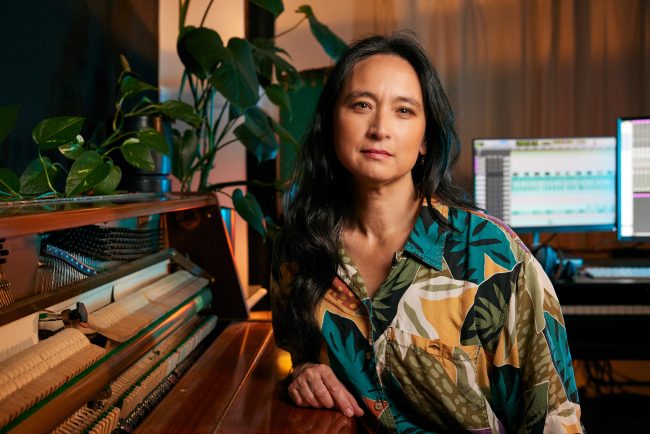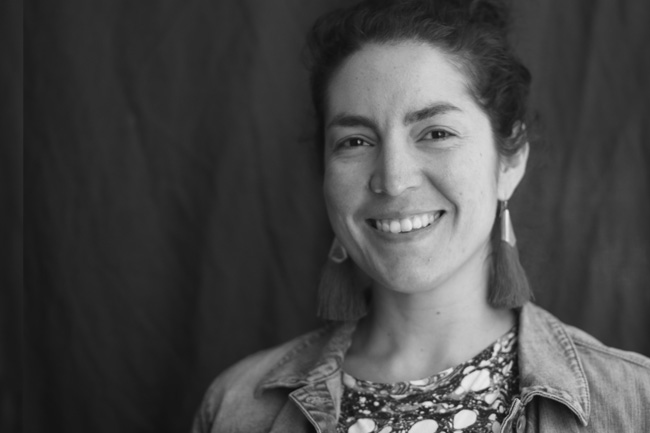Motherhood & Music – Not just the Lullaby
Approx. 6 minutes 30 seconds to read
If you look at Caitlin Yeo’s body of work, you may come to realise that her music has impacted you in a big way. She is one of the greatest musical storytellers with her composition and style bringing to life images and movement on screen. All her accomplishments and accolades in composing for screen are a result of a 14 year long journey and becoming a mum along the way. Read on to hear about Caitlin’s experience of motherhood and music.

Sonia de Freitas: Hi Caitlin, how are you and where does our interview find you today?
Caitlin Yeo: I’m sitting in my studio at Church Street Studios, Camperdown, Sydney. It’s a small room, with a wooden upright piano, a kilim rug, an old ornate lamp, some mid-century furniture, two large monitors, my beloved Genelec speakers and all my computer gear. It’s a quiet, busy one-woman workshop where I make a lot of music. I keep the door locked from the inside so no one can disturb me. I have learnt how precious time is, so I make the most of every moment in here.
SdF: Can you tell me a little more about your life as a mother and musician?
CY: My son is 18 and has just finished school last year. 21 years ago when I finished film school I thought I could become a mother and pursue a career at the same time! (ha ha!) I guess I didn’t realise that motherhood was a 24/7 job. I spent the early stages of my career and motherhood being selective with the screen commissions I would accept. As my time was limited, I could only say yes to commissions that had adequate schedules and resonated with me creatively on some level. When my son was a baby, I would write music during his naps. I had a baby monitor on top of the speakers, and as soon as he went to sleep, I would run downstairs to the garage (where my tiny studio was) and write furiously. These time restrictions taught me to write simply and effectively. I always had to commit to my first ideas and make them work as I had no time to second guess my work. I have carried this skill into my writing today and I am grateful that motherhood taught me this.
As my son now is all grown up, I face a different challenge. He is a young, capable, and independent man! These days when I am offered film work, I no longer need to consider his needs as a dependent child. If I’m not home to cook dinner, that’s ok. What a luxury! Now I need to embrace the art of putting myself first and saying yes. (Easier said than done after all these years)
SdF: What, if anything, may have changed for you in relation to the way you thought about music and your ambitions as a musician once you became a mother?
CY: I do believe my music got better once I became a mother. My compositions became more focussed, expressive, articulate, and emotional. I don’t know whether it’s because I had less time to anguish over certain pieces, or whether it gave me a stronger determination to succeed as I faced more barriers. Perhaps I felt most things much more deeply as a new mother and those complex emotions somehow found their way into my music. Looking back at that time now, I realise that I sacrificed a lot of my social life. I didn’t go out much and socialise for the first 12 years, instead I mostly stayed at home, looked after my son, and wrote music.
SdF: How do you maintain your artistic identity and career trajectory while raising your children?
CY: In 2018 Raising Films Australia (spearheaded by WIFT) released a report Honey, I Hid the Kids: Experiences of Parents and Carers in the Australian Screen Industry. In some ways it deals with the question; “How does a screen composer maintain their career in an industry that is set up to alienate professionals with carer responsibilities?” The biggest reveal of this report was that many professionals hid their caring responsibilities for fear of either not getting or losing the work. I did not do this. For me, I found a home writing music for documentary. Many of the producers and directors I worked with also had children of similar age and understood the time constraints and additional responsibilities involved. I never hid the fact that I was a mother, and always discussed it with the producers and directors as I negotiated the schedules on the commissions being offered. This helped me work on achievable commissions within the scope of the budget and time frames offered. The reality is that it took me 14 years to become a fulltime screen composer and quit part time teaching. It was certainly a slow burn as I learnt the nuances of my craft, and I am very grateful to the documentary industry for embracing me to this day.
SdF: What role do societal expectations and stereotypes about motherhood play in shaping the public perception of musicians who are mothers?
CY: Often people have been shocked at how organised I am, and how much I get done is so little time. Let’s just say I love a good spreadsheet. I think the preconceived notions around composers is that they are “airy fairy” creatives who live in their imaginations and compose at all hours of the day. Couple these stereotypes with the expectations that mothers do not have time (or opportunity) to do anything else but dedicate their lives to parenting their children, and the public perception and presence of mothers who are also successful composers is nearly non-existent. I think this is so far from the truth as I know many incredible composers who are also mothers! As they say, “if you want something done, ask a busy person!”. I would say a mother fits this bill perfectly.
SdF: How can the music industry evolve to better accommodate the needs of musicians who are navigating the intersection of motherhood and their music careers?
CY: The music industry, like many industries, has little measures in place to accommodate working mums. Their needs are nuanced and complex, and the systems in place for the music industry are not always conducive to the needs of carers. Firstly, I think that recognition of successful musicians who are also mothers as positive contributors to our industry is a good start! Also, putting support networks in place for mothers who take time out of their career, and want to re-enter the industry. Culturally, I think the attitudes around working mums in the industry (particularly young mums) still has a long way to go. Perhaps awareness programs, and more public industry support of musicians who are mums would be great.
SdF: What do you want for the future of music and for your children?
CY: I would love the world to value music and its creators. Streaming has absolutely decimated the industry, and it is so difficult for anyone to make a living in the music industry. Music can feed our souls, illuminate that which is within us, and soften our world. It expands our experience and enriches our lives. I would love to see a world that actively engages in music from all corners of the globe and pays for it fairly.
To learn more about Caitlin Yeo visit: www.caitlinyeo.com
To hear Caitlin Yeo’s music visit: Caitlin Yeo Spotify
Hear Caitlin Yeo latest work in the new TV series streaming on the ABC: After The Party – Stream from Sunday 28 April
For more information on International Women’s Day visit: internationalwomensday.com

Photo credit: Cathy Kirkpatrick
Keep an eye out for my next interview in the Shout Sister Shout: Motherhood & Music – Not just the Lullaby series where I interview Briana Cowlishaw.
Did you miss the previous Shout Sister Shout instalment? Read Emily Wurramara’s interview here.
Thank you to Eastside Radio for making the Shout Sister Shout: Motherhood & Music – Not just the Lullaby interview series possible.
I acknowledge the Traditional Owners of the many lands on which I am privileged to work, learn, teach, create and perform. I extend my respects to all First Nations People.